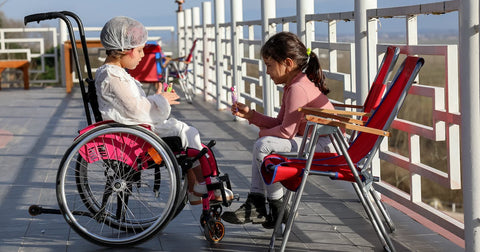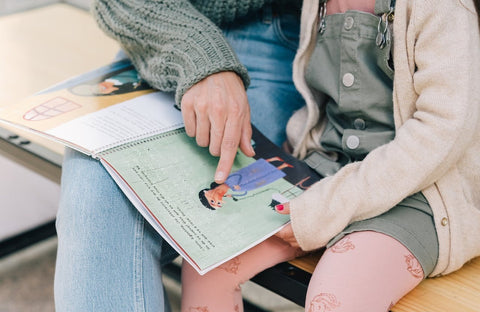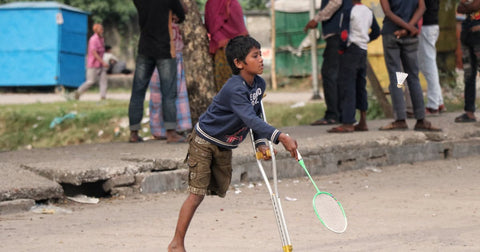How Hobbies Benefit Children with Disabilities
Hobbies are not just a way to pass the time; they play a critical role in our lives, shaping our identities, and helping us discover our passions. They provide an avenue for self-expression and personal growth. For children, these benefits are magnified, as hobbies contribute to their development and learning.
For children with disabilities, the role of hobbies can be even more significant. These activities serve as powerful tools for overcoming challenges and building skills. They provide an inclusive platform where children can shine, allowing them to focus on their abilities rather than their disabilities.
The Benefits of Hobbies for Children with Disabilities

Enhancing Physical Abilities
Hobbies such as swimming, horse riding, or even playing a musical instrument can help improve coordination, balance, and physical strength in children with disabilities. These activities offer a fun and engaging way to work on physical skills outside the confines of traditional therapy sessions.
Boosting Cognitive Skills
Engaging in hobbies like puzzles, reading, or board games can stimulate cognitive development. These activities encourage problem-solving, enhance memory, and promote focus and concentration. They challenge children's minds, pushing them to think, plan, and execute, thus fostering cognitive growth.
Encouraging Social Interaction
Group activities or hobby clubs provide opportunities for social interaction. Participating in a shared hobby with peers allows children with disabilities to build friendships, enhance communication skills, and foster a sense of belonging. It also promotes understanding and acceptance among typically developing peers.
Building Confidence and Self-Esteem
Mastering a new skill or hobby can give a significant boost to a child's self-esteem and confidence. It gives them a sense of accomplishment and the courage to face new challenges. As they see their progress and receive recognition for their efforts, their belief in their abilities strengthens.
Providing a Sense of Accomplishment
When a child finishes a painting, scores a goal, or plays a song on an instrument, they experience a sense of achievement. This feeling can be incredibly empowering for children with disabilities, giving them the confidence to try new activities and face challenges.
Case Studies

Allison: Turning Interpersonal Skills into a Career Goal
Allison, an 18-year-old student with a specific learning disability in reading comprehension and written expression, is leveraging her strong oral expression and interpersonal skills to chart her future. Despite her academic challenges, she has maintained good grades in school and met her IEP goals.
Allison's passion lies in working with younger children. She regularly helps her older sister, a first-grade teacher, prepare materials for lessons. This hands-on experience has sparked an interest in working with preschoolers or kindergarteners, though she is unsure if she wants to be a classroom teacher. Outside school, Allison enjoys working out at the gym, and playing softball in a county league, showing that her disability doesn't limit her from leading a balanced and active life.
Jamarreo: Mechanical Passion Fuels Career Aspirations
Jamarreo, identified with emotional and behavioural disabilities and moderate hearing loss, is turning his hobby into a career. His strong interpersonal skills and work ethic, coupled with his interest in mechanical work, have guided his career path.
Jamarreo's academic journey has been supported by a programme that includes career-related courses, paid work experiences, and job-specific training. He works part-time at his uncle's welding shop and has expressed interest in working in a similar environment after high school. His passion extends to racing cars on the weekends, a hobby he shares with friends. His story illustrates how hobbies can foster a sense of community and camaraderie while also shaping career aspirations.
Paulo: A Story of Progress, Family Support, and Potential
Paulo, a student with autism and a mild cognitive disability primarily communicates through adapted sign language, gestures, words, and vocalisations that are understood by his family and teachers. His family, immigrants from Brazil, have been actively involved in his education and transition planning process, providing a supportive environment at home where he lives with his parents and two siblings.
Despite his disabilities, Paulo enjoys a range of activities. He loves watching movies with his sister and partaking in outdoor tasks like raking leaves or sweeping the patio. Inspired by his older brother, a college soccer player, Paulo has also developed some soccer skills. Though his opportunities for external leisure activities are limited, his parents encourage him to engage in recreational activities as long as he completes his chores at home. This balance of responsibility and leisure is crucial for his personal and academic growth.
These case studies demonstrate how hobbies and passions can be harnessed to help children with disabilities develop practical skills, build confidence, and shape their futures.
Tips for Encouraging Hobbies in Children with Disabilities

Understanding the Child’s Interests and Abilities
Begin by understanding the child's interests and abilities. This will help you choose activities that they'll enjoy and be able to participate in effectively. It's important to involve the child in this process, letting them explore different activities and choose ones that resonate with them.
Choosing Appropriate Activities
Select activities that are suitable for the child's age and ability level. Adaptations may be necessary to ensure the activity is accessible and enjoyable. Be mindful of the child's physical limitations and cognitive abilities, and select hobbies that align with their level of functioning.
Creating a Supportive Environment
Create an environment that encourages participation and celebrates effort and progress. Remember, the goal is enjoyment and skill-building, not competition. Providing positive reinforcement and celebrating small victories can go a long way in motivating the child and making them feel valued.
Celebrating Progress, Not Perfection
Celebrate every milestone, no matter how small. Progress isn't about perfection; it's about improvement and the joy of participation. Acknowledging the child's efforts and improvements can boost their confidence and encourage them to continue engaging in their chosen hobby.
Enriching Lives Through Hobbies

Hobbies offer a multitude of benefits for children with disabilities, enhancing physical and cognitive abilities, while also facilitating a boost in confidence and a sense of accomplishment. At Hobbyco, we believe in the transformative power of hobbies and strive to create supportive environments that encourage children with disabilities to explore their interests and discover their potential.
Our mission extends beyond merely providing pastime activities for these children. We aim to empower them, enabling the development of their skills and enhancing their quality of life. As we continue our journey, let's celebrate the abilities and achievements of these remarkable children, appreciating not just how far they've come, but also the bright future that lies ahead.





















































